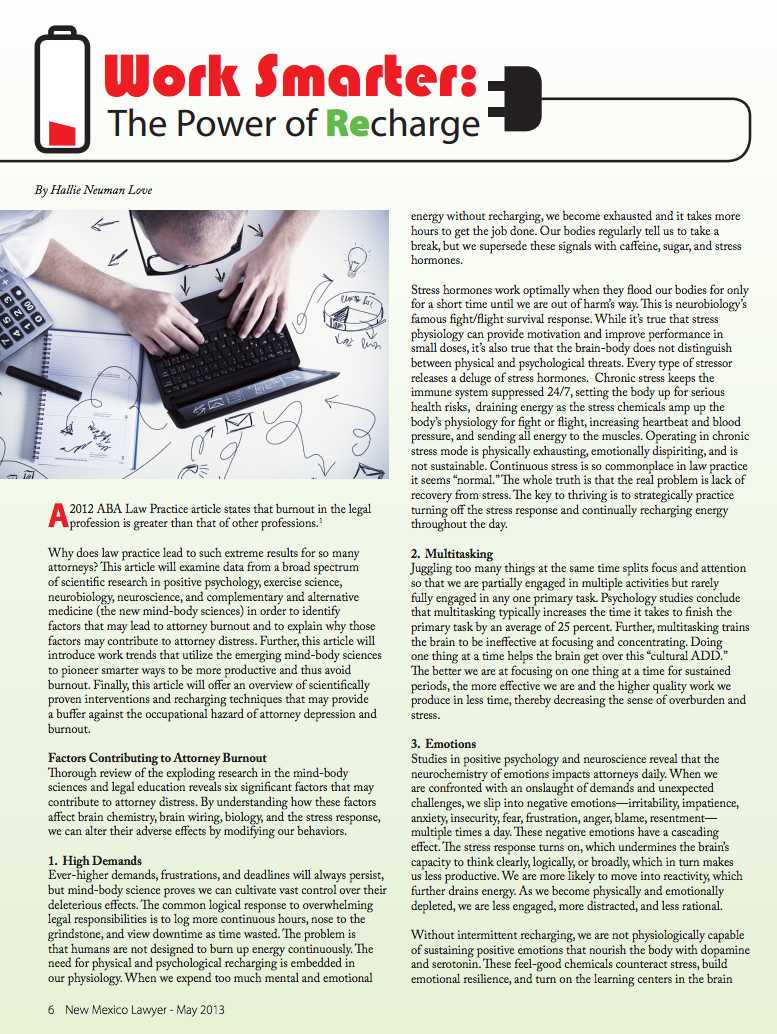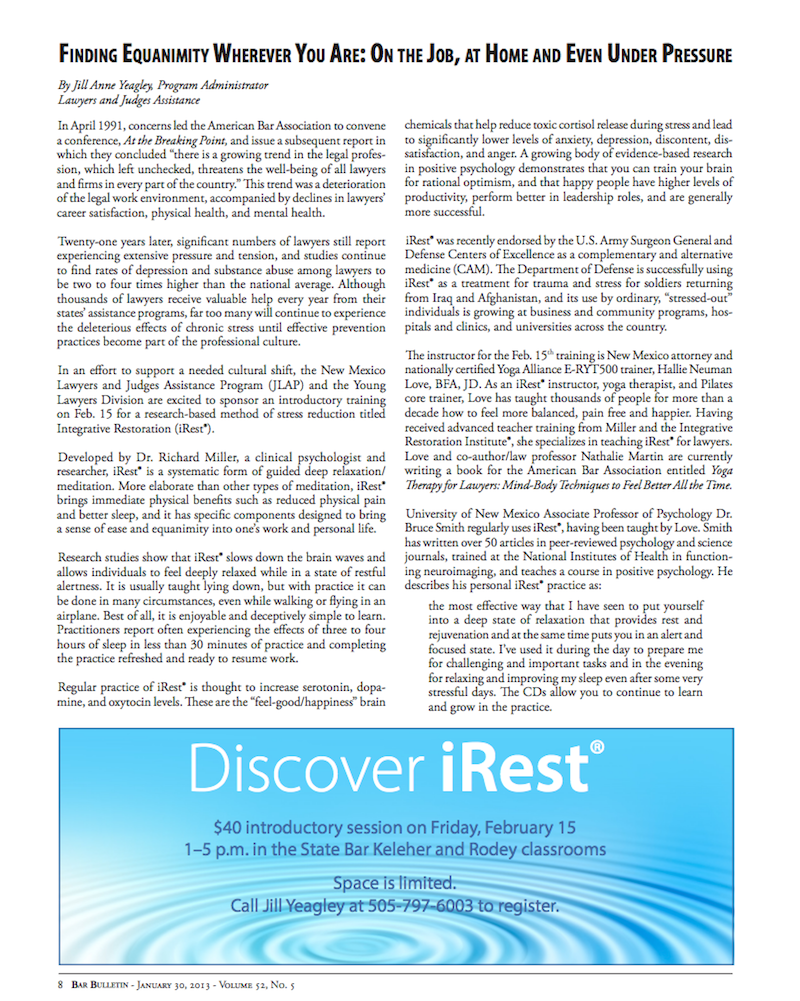What is Secondary Trauma?
Consider immigration and civil rights attorneys, public defenders, prosecutors, juvenile justice attorneys and family law attorneys (just to name a few) who are barraged on a daily basis with stories of traumatic hardship or violence. Many attorneys, day in and day out, directly observe their clients’ pain, fear and terror as they listen to accounts of adversity and suffering. Many attorneys read stacks of heart wrenching reports of traumatic events, or view endless graphic evidence. The cumulative direct exposure to others’ trauma can result in emotional duress to the lawyers and judges and other legal personnel who work with traumatized populations.
When lawyers are continually called on to support their clients and listen to their traumatized clients’ feelings and experiences it is nearly unavoidable to not take in some emotional pain. Further, lawyers are obliged to control their reactions so they often maintain an image of toughness, or seek to appear unruffled as a stronghold of calm. They often feel a responsibility to fix their clients’ trauma, conceivably by winning, even when they have no control over the outcome. Imaginably they may feel guilt when the outcome is not positive. To make matters more difficult, lawyers’ high caseloads mean the exposure to trauma may never let up.
Under these conditions it’s not surprising that some lawyers empathize with, internalize, and to some degree, experience their clients’ feelings of fear, hopelessness, anger or rage. Secondary trauma can create within lawyers a state of psychological tension and preoccupation. Some may experience disturbing images from cases intruding into their thoughts or dreams, and they may experience intense emotions alongside these images. Another area of concern is that a lawyer, having been triggered by secondary trauma, may find him/herself re-experiencing personal past trauma memories.
Leading trauma, emotional intelligence, and resilience authorities agree that emotional residue from trauma gets lodged in the brain, body and nervous system. A brain response is the uncontrollable hair trigger for emotional hijacking. Body responses may be physical and emotional exhaustion, stomachaches, headaches, nausea, and a variety of physical illness. Nervous system responses may include feeling upset, on edge, or powerless and hopeless.
Secondary trauma can produce extreme imbalances in the autonomic nervous system, whereby one can get stuck in a neurochemical deluge of fight, flight, freeze, or shut-down physiology. Some nervous system symptoms of secondary trauma mimic post traumatic stress disorder. These common symptoms include: anxiety, feeling emotionally overwhelmed, depression, insomnia and other sleeping problems, concentration problems, memory problems, feeling numb, feeling agitated and prone to anger, or hyper-vigilant and viewing the world as inherently dangerous.
Further, attorneys may begin to question their own competence or efficacy. With lower self-esteem and PTSD-like symptoms producing problems in work and personal relationships they may further spiral downward and be at risk for self- medicating and substance abuse. And, of course, all these responses to trauma result in less productivity and less effective representation.
While it’s true that secondary trauma may be nearly unavoidable in some legal fields, it’s important to understand that it is a logical response to the job. It is also vital to recognize that using prevention strategies can help you cope with your feelings and support your nervous system to mitigate this trauma.
Those that chronically endure the effects of secondary trauma without fortifying themselves against its effects or treating it may experience debilitation that forces them to stop working or leave the field of law.
How Can Lawyers Prevent Secondary Trauma?
The types of tools for resilience training offered by the science of positive psychology can help prevent secondary trauma. “Resilience Training for Lawyers” will be the focus of a companion article in the Bar Bulletin Positive Psychology series, available in the near future. For now, here’s a brief overview of resilience:
Resilience is the process of adapting well in the face of adversity, trauma, tragedy, threats or significant sources of stress. It means, “bouncing back” from difficult experiences.
Resilience training focuses on developing awareness of thoughts, emotions, behaviors and physiological responses (usually with mindfulness training) so you can self-regulate and change those thoughts, emotions, behaviors and physiology to achieve a desired positive outcome. Other important aspects of building resilience include a strengths-based focus in order to be more engaged, overcome challenges, and create a life aligned with one’s values. Resilience is also significantly enhanced when one is able to cultivate close relationships, acquire the ability to look at situations from multiple perspectives, think creatively, develop optimism, and practice mind-body techniques that keep the autonomic nervous system in balance.
To prevent the long-term, deleterious effects from secondary trauma, it is advisable to conduct periodic self-assessments to determine if you are beginning to experience depletion, and to create an effective action plan.
Here are several effective preventative elements to incorporate into your life:
- Resilience training
- Self-care such as vacations, work breaks, exercise, healthy eating, quality sleep, hobbies or activities outside work and connection with friends and family;
- Regular use of stress-reduction techniques such as yoga, meditation, mind fulness, breathing exercises, body sensation scans and deep nervous system relaxation to turn off the fight, fight, or freeze nervous system response;
- Wherever possible have a reduced or diverse caseload, a holistic approach to work that includes overall life quality, and the ability to debrief with others who are knowledgeable and supportive of how you think and feel and how you are affected;
- Professional assistance, when necessary, is an additional avenue to increase well- being and resilience.
Treatment
It is now well understood that trauma affects the nervous system and that residue from trauma continues to affect neurophysiology even after the traumatic event has passed. To move the absorbed trauma out of the body, trauma experts agree that body-based techniques are key strategies.
Here’s how trauma can get lodged in the body: people who have experienced trauma often have continued autonomic nervous system and hypothalamic-pituitary-adrenal activity from the initial trauma. This is because a traumatized individual’s brain doesn’t distinguish between past trauma and present peril. The brain continues to indicate danger, and individuals feel body sensations from the danger long after the initial traumatic occurrence. Some body sensations may feel frightening—for example, a knot in the belly, breath-limiting tension or heart-pounding in the chest, a constricted throat, pain or thick fog in the head, the need to fight, take flight or freeze. Individuals can also experience hypo-arousal where they numb out, shut down or dissociate. If frightening sensations aren’t given time and attention to move through the body and resolve or dissolve, individuals may continue to be traumatized.
Body-based therapy provides lawyers with safe, natural tools to manage and neutralize the physiological symptoms and body sensations related to trauma. Body-based therapies heal the fight flight-freeze-collapse nervous system response and create a feeling of safety in the body whereby individuals can attain a calm and peaceful mind, experience emotions in a healthy way, feel a sense of strength, control and efficacy, and thereby begin to alleviate the malady.
Traditional talk therapy can help with insights, but when one digs up memories and relives the event by retelling the story, it can reignite the agony without undoing the effects of dread, anger, powerlessness, or depression contained within the body. This is one reason that individuals with PTSD-like symptoms respond well to body-based therapies coupled with psychotherapy.
A three-year yoga and trauma study funded by the National Institutes of Health found that participation in trauma-informed yoga significantly reduced PTSD symptoms in women with treatment-resistant complex PTSD
Integrative Restoration® Yoga Nidra (iRest) is a proven body-based approach used by that the military, VA centers and countless other civilian organizations to overcome trauma. As iRest founder Richard Miller explains,
“It works directly by changing sensory, cognitive and emotional symptoms that keep PTSD in place. It’s shown to bring about deep relaxation while also producing healthy changes in the structure of your brain, stimulating healing and tissue repair, providing you self-care skills for changing negative emotions and thoughts into positive ones... to restore an inner sense of ease and well-being.”
What is Post Traumatic Growth?
People who endure psychological struggle following adversity often see positive growth afterward. As part of treatment for trauma, it’s valuable to be aware of post-traumatic growth as a possibility. is is because if all you know is post-traumatic stress disorder and you have some horrible occurrence where you think you’re going down a slippery slope, the symptoms will worsen. If instead, you understand that a typical response to trauma is resilience, that given time you may be stronger as a result of what you experienced, and that it’s also possible to experience growth, the downward spiral can be stopped.
Psychologist Richard Tedeschi, professor of psychology at the University of North Carolina, and Harvard psychologist Richard McNally, created a course taught to US Army soldiers on post-traumatic growth that begins with the wisdom that positive growth and personal transformation following trauma comes from a renewed appreciation of being alive, enhanced personal strength, acting on new possibilities, improved relationships, and spiritual deepening (“spiritual” meaning belonging to or serving something larger than the self).
Conclusion
In conclusion, enhancing resilience can help prevent secondary trauma, and body-based therapies can help heal secondary trauma. It is important to take care of yourself in order to not become a victim of secondary trauma. Secondary trauma can cause debilitating physical and emotional symptoms as well as functional impairment such as difficulty solving problems, increased errors, and low motivation or productivity that interferes with effective legal representation and negatively impacts the legal profession.
Remember, in order to effectively advocate for your client—you need to effectively care for yourself first

 A Huichol boy has been selected by the creator of all growing things to escape the coming flood.
A Huichol boy has been selected by the creator of all growing things to escape the coming flood.




